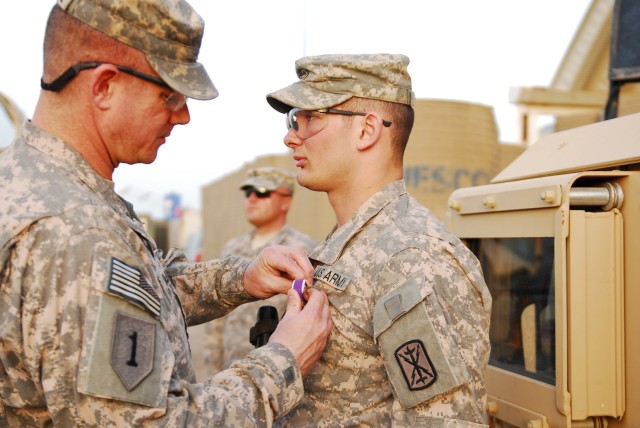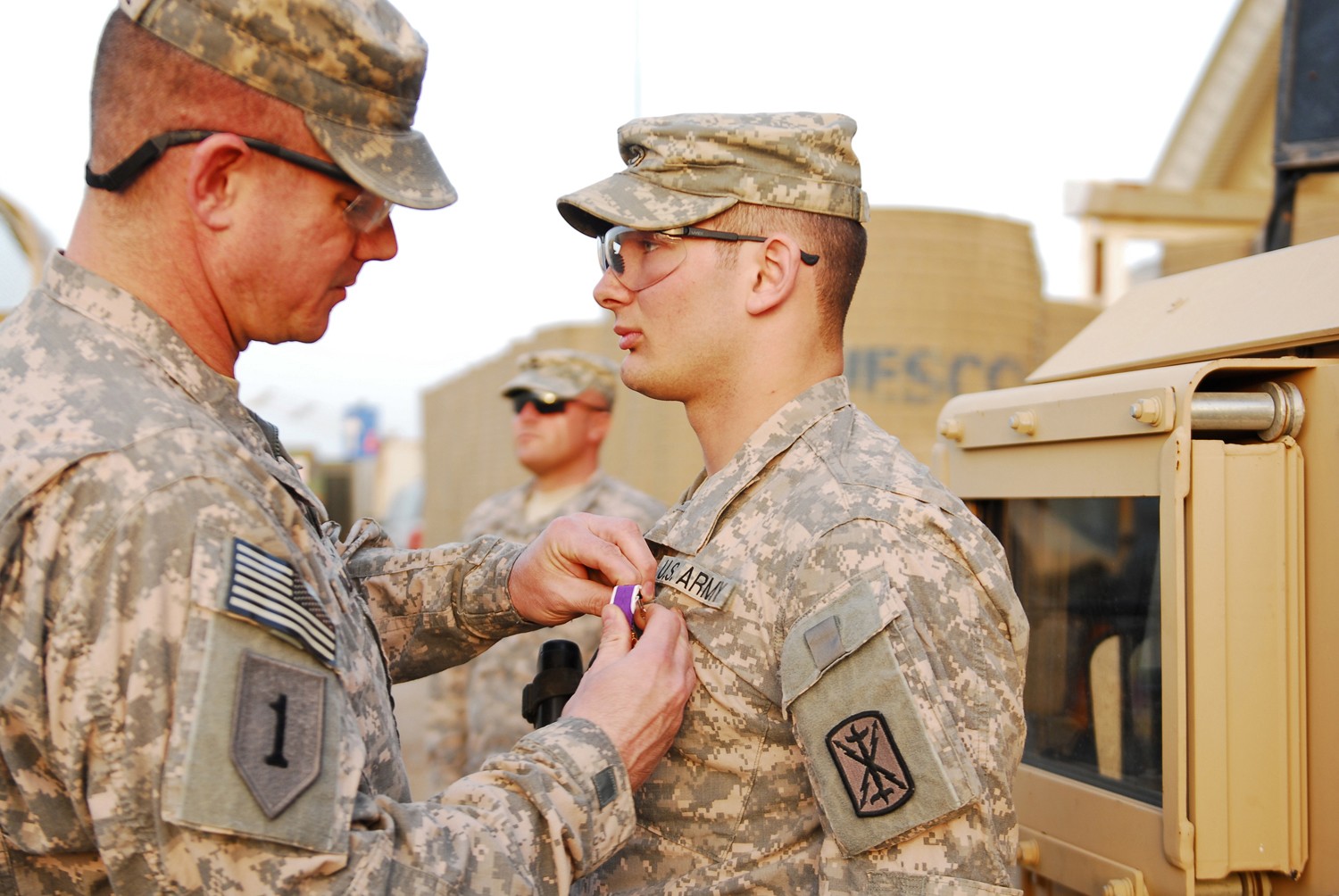"Nothing seemed different; it was just like any other time that we went out. I was scanning my area, up, down, side-to-side, just as I've been taught. We pulled in to the area and everything seemed as it had on so many other occasions, until..."
That's how Pfc. Cameron R. Hebert, a gunner from Berry, Ala., recalled the day he was hit with a Molotov cocktail.
Early that morning, Jan. 5, 2010, Hebert and the Soldiers of Team 1, Brigade Maneuver Element, Headquarters and Headquarters Battery, 17th Fires Brigade, were escorting a civil affairs team to Timinyah, in Basrah, Iraq. Their mission was to talk to the people of the area about how they could help better their community.
"We escorted the team through the area and they conducted their assessment without any problems, but it was clear by the tension in the atmosphere that we were not welcomed," said Staff Sgt. Richard Chapel, convoy commander.
The team finished talking to those who were not scared to speak, and were escorted safely back to the vehicles for the return trip home. That's when things took a turn for the worse.
"There were kids that were throwing rocks at the convoy, so I began scanning slowly in their direction to ensure the situation didn't escalate, Hebert said.
While Hebert was keeping the miscreant stone bearers at bay, little did he know that behind him lurked an insurgent determined to take his life.
As the convoy began rolling out, Sgt. 1st Class John C. Zanella, BME noncommissioned officer in charge, was first to notice the attacker approaching.
"I saw a man who looked to be in his mid-twenties running towards us with a Molotov cocktail in his hand," Zanella said.
A Molotov cocktail, also known as a gasoline or petrol bomb, is composed of a glass bottle of fuel usually with a source of ignition such as a burning cloth wick held in place by the bottle lid. Thickening agents are added to the fuel to give it an adhesive affect, ensuring extensive damage.
With the explosive in the attacker's hand and his arm drawn back ready for release, Zanella fired from the moving vehicle.
The man hurled the volatile cocktail and turned to a nearby alley. Zanella fired two more shots and gave chase, keeping his eyes on the suspect while radioing his position for his team members to follow.
The bottle landed squarely on the side of Hebert's turret and instantly engulfed the turret in flames.
"I just remember it getting very hot. I glanced around and then saw the flames climbing up the side of my right arm," Hebert said.
In shock, Hebert calmly said, "I'm on fire." Realizing the seriousness of his state he franticly repeated, "I'm on fire, I'm on fire!"
Seeing the flames from a vehicle ahead, Staff Sgt. Joseph R. Dye, personal security officer, raced to the truck where the driver, Pfc. Brittany D. Gutierrez, released the combat-locked door, giving Dye access to the fire extinguisher.
Hebert dropped into the vehicle through the gunner's hatch.
"I could feel the heat from flames climbing up my arm towards my neck," he said. "That's when I saw Sergeant Dye with the fire extinguisher. He put out the flames and our medic, Specialist Frazier, immediately began treating my wounds."
"When she finished, she asked me if I was OK and I told her, 'It hurts a little, but I'm good.' She asked, 'Are you sure'' I said, 'Yeah I'm good.' Then I got back in to the turret and started scanning my area again," Hebert said.
Moments later, Zanella radioed back to the convoy that he and a few members of the team, along-side the Iraqi Army, had chased the suspect into what he described as a mosque.
Members of the Iraqi Army entered the mosque and brought out several individuals matching the description of the attacker for Zanella to identify.
Through the help of an interpreter, Zanella identified the attacker, but the Iraqi Army was hesitant to detain the individual, as they did not witness the attack.
Zanella then gave instructions to Cpl. Dustin J. Anderson, truck commander, to put the suspect in wrist restraints and turn him over to the Iraqi soldiers.
After returning safely to Contingency Operating Base Basra, the events of the day were reported and Hebert went to the medical center for further treatment of his injuries.
After a medical examination cleared Hebert for duty, he was off on another mission a few hours later.
A couple of weeks later outside the HHB "Lightening" headquarters, an award ceremony was held in Hebert's honor. He stood proudly in front of a small formation and was presented a Purple Heart by Col. Steven L. Bullimore, 17th FiB commander.
"I'm honored to receive this medal, but no one aspires to get a Purple Heart," Hebert said. "I have to thank Sergeant Z for what he did that day. That guy would have had a clear shot at me and things could have been much worse had Sergeant Z not re-acted so quickly."
"I want to thank all the team for their support and let you know that I'm not scarred by what happed that day," he said. "We were doing a job and it's just something that happened."
This was the first Purple Heart awarded to a 17th FiB Soldier during this deployment.


Social Sharing